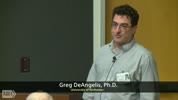-
- NIH VideoCast - NBBTP Celebration of Accomplishments
-
- - Deborah E. Wilson, Dr PH, CBSP, RADM US Public Health Service, Director, DOHS and Marcus Hodges, Ph.D. Fellowship Director (2016/01/21)
- - Category : Special
- NBBTP`s Celebration of the accomplishments of our four senior fellows: Chad Austin, PhD; Cristine Campos,PhD ; Brandon Hatcher, PhD ; Chelsea Schiano,PhD ; and the recognition of the mentors of the Division of Occupational Health & Safety for their hard work and dedication.
NIH VideoCast - NBBTP Celebration of Accomplishments
-
- NIH VideoCast - It takes two to tango: DNA polymerase responses to replication stress in human cells
-
- - Dr. Kristen Eckert, Penn State University (2016/01/21)
- - Category : DNA Repair
- DNA Repair Interest group
Acrobat Slides
NIH VideoCast - It takes two to tango: DNA polymerase responses to replication stress in human cells
-
- NIH VideoCast - Demystifying Medicine 2016: The Future of Medicine: Personalized, Precision, and Other
-
- - Eric Green, MD, PhD, NHGRI, NIH (2016/01/21)
- - Category : Demystifying Medicine
- Demystifying Medicine is an annual course from January to May designed to help bridge the gap between advances in biology and their application to major human diseases. The course includes presentation of patients, pathology, diagnosis, and therapy in the context of major disease problems and current research, primarily directed toward Ph.D. students, fellows, and staff. All are invited.
For more information go to https://demystifyingmedicine.od.nih.gov
NIH VideoCast - Demystifying Medicine 2016: The Future of Medicine: Personalized, Precision, and Other
-
- NIH VideoCast - Introduction to the Principles and Practice of Clinical Research (IPPCR) 2016: Research with Vulnerable Participants
-
- - David Wendler, Ph.D., NIH (2016/01/21)
- - Category : IPPCR
- The Introduction to the Principles and Practice of Clinical Research (IPPCR) is a course to train participants on how to effectively conduct clinical research. The course focuses on the spectrum of clinical research and the research process by highlighting epidemiologic methods, study design, protocol preparation, patient monitoring, quality assurance, and Food and Drug Administration (FDA) issues.
For more information go to http://clinicalcenter.nih.gov/training/training/ippcr1.html
NIH VideoCast - Introduction to the Principles and Practice of Clinical Research (IPPCR) 2016: Research with Vulnerable Participants
-
- NIH VideoCast - NIH Graduate Student Research Symposium 2016 "The Face of Tomorrow`s Science"
-
- - Pauline Rose Clance, Ph.D., Georgia State University (2016/01/16)
- - Category : Career Development/OITE
- NIH Graduate Student Research Symposium "The Face of Tomorrow`s Science" keynote address will be presented by Pauline Rose Clance, Ph.D., Board Certified Clinical Psychologist. Author - "The Imposter Phenomenon: Overcoming the Fear that Haunts Your Success"
For more information go to https://www.training.nih.gov
NIH VideoCast - NIH Graduate Student Research Symposium 2016 "The Face of Tomorrow`s Science"
-
- NIH VideoCast - Lasker Lessons in Leadership: Communication
-
- - Linda Fried, MD, MPH, Columbia University Medical Center (2016/01/16)
- - Category : Special
- Lasker Lessons in Leadership is a lecture series aimed at bringing top scientists and medical leaders to the NIH to serve as inspiration for future leadership amongst the MD/PhD and PhD students enrolled in the NIH Oxford-Cambridge Scholars Program and the NIH Lasker Clinical Research Scholars Program.
Albert and Mary Lasker Foundation, the International Biomedical Research Alliance, the NIH Oxford-Cambridge Scholars Program, Certara, and WCG
For more information go to http://oxcam.gpp.nih.gov
NIH VideoCast - Lasker Lessons in Leadership: Communication
-
- NIH VideoCast - CC Grand Rounds: Contemporary Clinical Medicine: Great Teachers: The Digital Doctor: Hope, Hype, and Harm at the Dawn of Medicine`s Computer Age
-
- - Robert M. Wachter, MD Professor and Interim Chair, Department of Medicine, University of California, San Francisco (2016/01/15)
- - Category : Clinical Center Grand Rounds
- CC Grand Rounds: Contemporary Clinical Medicine: Great Teachers: The Digital Doctor: Hope, Hype, and Harm at the Dawn of Medicine`s Computer Age
For more information go to http://www.cc.nih.gov/about/news/grcurrent.html
NIH VideoCast - CC Grand Rounds: Contemporary Clinical Medicine: Great Teachers: The Digital Doctor: Hope, Hype, and Harm at the Dawn of Medicine`s Computer Age
-
- NIH VideoCast - The importance of growing slowly: roles for redox active "antibiotics" in microbial survival
-
- - Dianne K. Newman, Ph.D., Professor of Biology and Geobiology at California Institute of Technology; Investigator, Howard Hughes Medical Institute (2016/01/15)
- - Category : WALS - Wednesday Afternoon Lectures
- Wednesday Afternoon Lecture Series
Microorganisms have dominated the biosphere for billions of years, and have impacted every facet of the Earth???s near-surface environments. For the first billion years of their existence, they thrived in the absence of molecular oxygen. Though microorganisms (including those dominating chronic infections of the lung, and other body parts) are capable of generating energy in the absence of oxygen with alacrity, more often than not, they are studied in the laboratory where they grow rapidly under oxygen-replete conditions. We know surprisingly little about how microbes survive under anoxic conditions when they are dividing slowly. Yet slow-growth under anoxia defines much of microbial existence. In this lecture, Dr. Newman will introduce the importance of anaerobic, slow-growth physiology in the microbial world, focusing on a problem of clinical relevance: how the opportunistic pathogen, Pseudomonas aeruginosa, survives in the largely anoxic mucus collecting in the lungs of individuals with cystic fibrosis. The story of its survival is colorful, pivoting around its usage of a class of redox-active pigments called "phenazines", which act as antibiotics in the presence of oxygen. Dr. Newman will discuss a variety of important physiological functions phenazines play for P. aeruginosa under anoxic conditions that transcend their antibiotic activity, including facilitating ATP generation, redox homeostasis, iron acquisition, survival in multicellular communities, and cell-cell signaling. She will close the lecture by discussing the importance of better understanding slow-growth physiology for controlling microbial activities in a variety of contexts, including those of relevance to human health.
For more information go to https://oir.nih.gov/wals
NIH VideoCast - The importance of growing slowly: roles for redox active "antibiotics" in microbial survival
-
- NIH VideoCast - Modulation of T Cell Signaling by ITK.
-
- - Leslie Berg, Ph.D.; Professor Department of Pathology, University of Massachusetts Medical School, Worcester (2016/01/15)
- - Category : Immunology
- Immunology Interest Group
Leslie Berg is a Professor in the Department of Pathology at the University of Massachusetts and the Director of graduate program in Microbiology and Immunology, who is well known for her key studies in T lymphocyte signaling. While a postdoctoral fellow with Mark Davis, she generated the first Class II-specific TCR transgenic mice and used them for seminal studies on thymic selection. As an Assistant Professor, she cloned out a series of tyrosine kinases expressed in T cells including Jak3 and Itk. Through the generation and study of gene-targeted mice that lack these kinases, her work has centered on uncovering the signaling pathways these kinases regulate in T cell biology. Focusing on Itk, her lab demonstrated its role in PLC-g activation downstream from the TCR and how Itk-mediated signaling pathways affect T cell development, differentiation and function. Her work has provided insight into the role of TCR signaling in regulating Th1/2 differentiation, Innate vs conventional T cell development and CD8 functional responses. More recently, her work has also expanded to understanding epigenetic changes induced by cytokines and signaling during T cell differentiation. Dr. Berg has received numerous awards and is a former President of the AAI. She is an engaging speaker and wonderful colleague and we encourage you to come hear her newest and exciting insights into T cell biology.
NIH VideoCast - Modulation of T Cell Signaling by ITK.
-
- NIH VideoCast - Cultural neuroscience: Closing the gap in population mental health disparities
-
- - Joan Chiao, Ph.D., Director of the International Cultural Neuroscience Consortium (2016/01/14)
- - Category : BSSR - Behavioral and Social Sciences
- Behavioral and Social Sciences Research Lecture Series
To ask QUESTIONS during the Q&A session:
Twitter: @NIHOBSSR or #BSSRLectureSeries
Email: Isabel.estrada@nih.gov
Mental health disorders pose a significant global financial burden in treatment annually. A key challenge facing global mental health is to understand the etiology and treatment of mental health disparities, including the mechanisms of population disparities in mental health. Cultural neuroscience is a research field that examines the cultural, environmental and genetic factors that shape psychological and neural processes underlying behavior. Recent advances in cultural neuroscience demonstrate the relevance of culture in modulating brain and behavior. This talk will provide an overview of advances in cultural neuroscience, with discussion of the implications of this research for closing the gap in population mental health disparities.
Learn more and register http://events.r20.constantcontact.com/register/event?oeidk=a07ebukj7wg449b49ce&llr=vykrlptab
For more information go to http://events.r20.constantcontact.com/register/event?oeidk=a07ebukj7wg449b49ce&llr=vykrlptab
NIH VideoCast - Cultural neuroscience: Closing the gap in population mental health disparities
-
- NIH VideoCast - Neural Computations of Depth from Motion Parallax
-
- - Greg DeAngelis, Ph.D., University of Rochester (2016/01/14)
- - Category : Neuroscience
- NIH Neuroscience Seminar Series
Dr. DeAngelis` laboratory studies cortical circuits that mediate visual perception and visually guided behavior. This work involves a creative fusion of the disciplines of neurophysiology, psychology, and computation. Monkeys are trained to perform demanding discrimination tasks, and we record from single or multiple neurons in visual cortex during performance of these tasks. This allows them to directly compare the ability of neurons to discriminate between different sensory stimuli with the ability of the behaving animal to make the same discrimination. This approach also allows them to examine the relationship between neuronal activity and perceptual decisions (independent of the physical stimulus). In addition, the techniques of electrical microstimulation and/or reversible inactivation are used to establish causal links between physiology and behavior. Computational modeling plays an important role in interpreting results and guiding future experimentation.
NIH VideoCast - Neural Computations of Depth from Motion Parallax
-
- NIH VideoCast - Introduction to the Principles and Practice of Clinical Research (IPPCR) 2016: Institutional Review Boards
-
- - Jerry Menikoff, M.D., J.D., Office for Human Research Protections, HHS (2016/01/14)
- - Category : IPPCR
- The Introduction to the Principles and Practice of Clinical Research (IPPCR) is a course to train participants on how to effectively conduct clinical research. The course focuses on the spectrum of clinical research and the research process by highlighting epidemiologic methods, study design, protocol preparation, patient monitoring, quality assurance, and Food and Drug Administration (FDA) issues.
For more information go to http://clinicalcenter.nih.gov/training/training/ippcr1.html
NIH VideoCast - Introduction to the Principles and Practice of Clinical Research (IPPCR) 2016: Institutional Review Boards
-
- NIH VideoCast - IACC Full Committee Meeting - January 2016
-
- - Interagency Autism Coordinating Committee (2016/01/14)
- - Category : Interagency Autism Coordinating Committee
- The IACC will meet to discuss ASD research and services activities.
NIH VideoCast - IACC Full Committee Meeting - January 2016
-
- NIH VideoCast - Demystifying Medicine 2016: Ebola, MERS, and Likelihood of More Epidemics & Evolutionary Dynamics and Zoonotic and Cross-Species Transmission of Emerging Viruses
-
- - Anthony Fauci, MD, NIAID, NIH and Vincent Munster, PhD, NIAID, NIH (2016/01/14)
- - Category : Demystifying Medicine
- Demystifying Medicine is an annual course from January to May designed to help bridge the gap between advances in biology and their application to major human diseases. The course includes presentation of patients, pathology, diagnosis, and therapy in the context of major disease problems and current research, primarily directed toward Ph.D. students, fellows, and staff. All are invited.
For more information go to https://demystifyingmedicine.od.nih.gov/
NIH VideoCast - Demystifying Medicine 2016: Ebola, MERS, and Likelihood of More Epidemics & Evolutionary Dynamics and Zoonotic and Cross-Species Transmission of Emerging Viruses
-
- NIH VideoCast - Introduction to the Principles and Practice of Clinical Research (IPPCR) 2016: Mock IRB
-
- - Jerry Menikoff, M.D., J.D., Office for Human Research Protections, HHS (2016/01/14)
- - Category : IPPCR
- The Introduction to the Principles and Practice of Clinical Research (IPPCR) is a course to train participants on how to effectively conduct clinical research. The course focuses on the spectrum of clinical research and the research process by highlighting epidemiologic methods, study design, protocol preparation, patient monitoring, quality assurance, and Food and Drug Administration (FDA) issues.
For more information go to http://clinicalcenter.nih.gov/training/training/ippcr1.html
NIH VideoCast - Introduction to the Principles and Practice of Clinical Research (IPPCR) 2016: Mock IRB
-
- NIH VideoCast - National Science Advisory Board for Biosecurity Meeting - January 2016 (Day 2)
-
- - NIH (2016/01/12)
- - Category : National Science Advisory Board for Biosecurity
- Meeting on Biosecurity
NIH VideoCast - National Science Advisory Board for Biosecurity Meeting - January 2016 (Day 2)
-
- NIH VideoCast - National Science Advisory Board for Biosecurity Meeting - January 2016 (Day 1)
-
- - NIH (2016/01/10)
- - Category : National Science Advisory Board for Biosecurity
- This is a meeting discussing biosecurity.
NIH VideoCast - National Science Advisory Board for Biosecurity Meeting - January 2016 (Day 1)
-
- NIH VideoCast - Introduction to the Principles and Practice of Clinical Research (IPPCR) 2016: Data and Safety Monitoring Committees
-
- - Pamela Shaw, Ph.D., University of Pennsylvania (2016/01/09)
- - Category : IPPCR
- The Introduction to the Principles and Practice of Clinical Research (IPPCR) is a course to train participants on how to effectively conduct clinical research. The course focuses on the spectrum of clinical research and the research process by highlighting epidemiologic methods, study design, protocol preparation, patient monitoring, quality assurance, and Food and Drug Administration (FDA) issues.
For more information go to http://clinicalcenter.nih.gov/training/training/ippcr1.html
NIH VideoCast - Introduction to the Principles and Practice of Clinical Research (IPPCR) 2016: Data and Safety Monitoring Committees
-
- NIH VideoCast - CC Grand Rounds: (1) Homeostatic Control of Calorie Intake in Humans and its Role in Obesity Treatment and (2) Human Brown Adipose Tissue and Its Role in Treatment of Metabolic Diseases
-
- - (1) Kevin Hall, PhD, Senior Investigator, Integrative Physiology Section, Laboratory of Biological Modeling, NIDDK, NIH and (2) Aaron M. Cypess, MD, PhD, Investigator and Acting Section Chief, Translational Physiology Section, Diabetes, Endocrinology, and Obesity Branch, NIDDK, NIH (2016/01/09)
- - Category : Clinical Center Grand Rounds
- CC Grand Rounds: (1) Homeostatic Control of Calorie Intake in Humans and its Role in Obesity Treatment and (2) Human Brown Adipose Tissue and Its Role in Treatment of Metabolic Diseases
For more information go to http://www.cc.nih.gov/about/news/grcurrent.html
NIH VideoCast - CC Grand Rounds: (1) Homeostatic Control of Calorie Intake in Humans and its Role in Obesity Treatment and (2) Human Brown Adipose Tissue and Its Role in Treatment of Metabolic Diseases
-
- NIH VideoCast - Why Parents Matter (Epigenetically): Genomic Imprinting in Health and Disease
-
- - Marisa Bartolomei, Ph.D., Professor of Cell and Developmental Biology and Co-Director Epigenetics Program, Perelman School of Medicine at the University of Pennsylvania (2016/01/09)
- - Category : WALS - Wednesday Afternoon Lectures
- Wednesday Afternoon Lecture Series
Imprinted genes are expressed from a single parental allele and most reside in clusters that are located throughout the mammalian genome. The clusters typically contain an imprinting control region (ICR), which harbors allele-specific methylation and governs the imprinting of the entire domain. Although most imprinted clusters use long non-coding RNAs to regulate imprinted gene expression, a few are regulated by the transcriptional regulator CTCF and allele-specific insulator function. One such cluster harbors the H19 and Igf2 imprinted genes, and is controlled by an ICR that contains multiple CTCF binding sites. Gain of maternal methylation and loss of paternal hypermethylation of the H19/IGF2 ICR are associated with the human growth disorders Beckwith-Wiedemann Syndrome and Silver-Russell Syndrome, respectively. Using gene targeting and genome editing, Dr. Bartolomei`s team has generated embryonic stem cells, induced pluripotent stem-cell lines and mice to study the mechanisms of imprinting for these imprinted loci and to model the epigenetic mutations in human syndromes. Her lab has also developed SNP-FISH to study the dynamics of allele-specific gene expression at the single cell level in cell lines and tissues with loss of imprinting. In addition, her lab has studied imprinting in animal models of assisted reproductive technologies (ART) and endocrine disrupting chemical exposures (EDCs). Both ART and EDCs are associated with the increased loss of imprinting of various genes and with DNA methylation aberrations. The effects are especially pronounced in the placenta where the regulation of multiple genes and DNA methylation of repetitive elements are perturbed and where morphological changes are evident.
For more information go to https://oir.nih.gov/wals
NIH VideoCast - Why Parents Matter (Epigenetically): Genomic Imprinting in Health and Disease






















